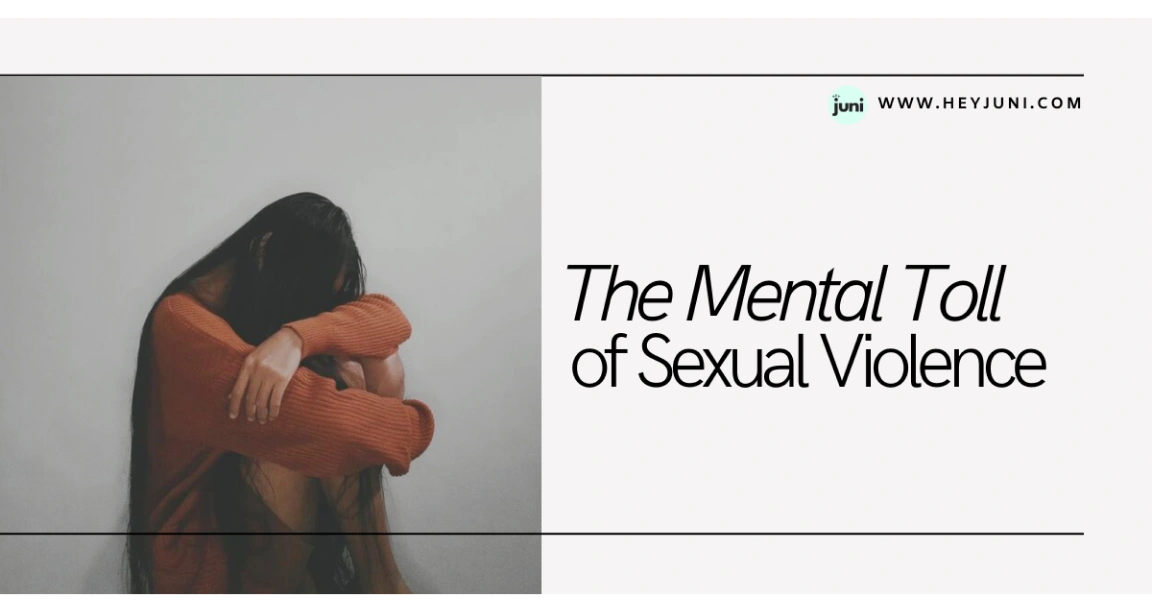Blog
Điểm đến để bạn tìm hiểu về HeyJuni và các thông tin sức khỏe tinh thần ngay tầm tay!
What Is the Impact of Sexual Violence on Mental Health and Well-being?
Written by: Askhita Bhatia
Date created: 06/12/24

Sexual violence (SV) is a deeply traumatic experience that can have lasting effects on mental health. Those who have been assaulted often face a complex range of emotions, from shame and anger to anxiety and depression. For many, the impact is long-term, influencing their relationships, self-perception, and day-to-day lives. Recognizing the mental health effects of sexual violence is essential as it can open pathways to healing, empowerment, and growth.
This article dives into the mental health consequences of sexual violence, with interactive tools and prompts to help you or your loved ones understand, process, and find support. Remember, there's no "right" way to feel or heal—every journey is unique.
The Immediate Effects: Trauma Response
After experiencing SV, many often go into "survival mode," a response rooted in our biology. This can manifest as:
- Shock and Disbelief: People may feel numb or detached, unable to process what happened. This is a natural response, as the mind tries to shield itself from overwhelming pain.
- Hyperarousal (Fight or Flight): Many experience heightened anxiety, making them hyper-aware of their surroundings, as if they're in constant danger.
- Avoidance: Some might avoid certain places, people, or situations that remind them of the assault.
Take a moment to check in with yourself or someone around you who has experienced SV. Have you noticed any patterns or triggers that seem linked to a specific memory? Writing these down can be a first step in recognizing and eventually reducing these responses.*
Common Forms of Sexual Violence
Sexual violence can take many forms, and understanding these distinctions can help in recognizing and addressing them:
1. Sexual Harassment
Often manifesting in workplaces, schools, and even public spaces, sexual harassment includes unwelcome advances, comments, or actions of a sexual nature. This might look like making unwanted sexual jokes, sending explicit texts, or repeatedly asking for dates despite being turned down. While it may be dismissed by some as "harmless," sexual harassment can lead to lasting psychological and emotional harm.
2. Sexual Assault and Rape
Sexual assault is any unwanted sexual contact, ranging from groping to more invasive forms of assault. Rape is a specific type of sexual assault that involves forced or non-consensual penetration. Both can have serious physical, mental, and emotional repercussions. Importantly, acts like rape aren't about sexual gratification; they're about control, power, and stripping the person being assaulted of their autonomy.
3. Coercion and Manipulation
Sometimes, sexual violence isn't violent in the traditional sense but relies on manipulation or pressure. Coercion can involve making someone feel obligated or intimidated into sexual acts through guilt, blackmail, or emotional manipulation.
4. Online Sexual Harassment and Image-Based Abuse
With the rise of digital spaces, sexual violence has extended online. Image-based abuse (such as non-consensual sharing of intimate images) and online harassment are forms of sexual violence that can be just as harmful and invasive as physical acts.
Social & Relational Impact
Sexual violence affects not just the individual but also their interactions and relationships with others. Those affected might experience:
- Difficulty Trusting Others: People who have experienced SV may struggle to trust people, especially in romantic relationships. The fear of betrayal or harm can lead to feelings of isolation and avoidance.
- Relationship Strain: For those already in relationships, SV can put significant stress on their partner or loved ones, as they navigate their own emotions and communication needs.
- Social Withdrawal: Due to feelings of shame or fear of judgment, those affected may avoid social situations or distance themselves from friends and family.
Think about a relationship that feels safe to you, whether with a friend, family member, or therapist. How does this person make you feel supported? Reflecting on this can help identify qualities and relationships that aid healing.
Understanding the mental health impact of sexual violence is a critical step toward fostering awareness, compassion, and meaningful support. The emotional scars left by sexual violence can be profound, but recovery is possible with the right tools, resources, and community. Recognizing and validating the range of emotions and challenges survivors face can help reduce stigma and pave the way for healing.
Bạn muốn biết thông tin mới nhất của HeyJuni?
Bạn muốn biết thông tin mới nhất của HeyJuni?
Nhấn đăng ký để nhận email về thông tin mới nhất của chúng mình!